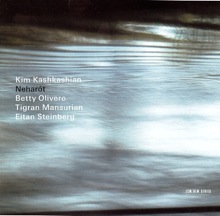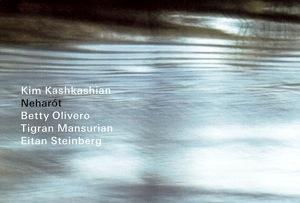Award-winning producer Manfred Eicher’s transcendent vision for his ECM New Series recordings defies simple categorization. A case in point is violist Kim Kashkashian's Neharót, a collection of unusual, oft-rarefied pieces that transcend national and genre boundaries, the recording touches the heart with its universal expressions of longing and prayer.
Israeli composer Betty Olivero began writing 
Two shorter works by Tigran Mansourian follow. Tagh for the Funeral of the Lord, based on ancient Armenian songs, blends the light of percussionist Robyn Schulkowsky’s bell-like vibraphone and gongs with Kashkashian’s darker viola. Oror finds Mansourian on piano, in an arrangement of a lullaby by (Armenian priest and martyr of the 1915 Armenian genocide) Komitas (or Gomidas) whose beauty and airy simplicity speak with compelling eloquence.
Next comes Gil Rose’s Boston Modern Orchestra Project performing Three Arias (Sung out the window facing Mount Ararat), a work Mansurian wrote for them and Kashkashian. In the last of the pieces, the viola sings exquisitely, providing an antidote for grief for that which is no longer within reach.
Eitan Steinberg’s Rava Deravin for viola and string quartet is based on a Hasidic setting of a 16th-century poem by kabbalist Rabbi Yitzhak Lurya. Originally a prayer for voice and small ensemble, it is heard here in a special arrangement for viola and the Kuss Quartet. Once again, Kashkashian’s eloquent instrument provides the warmth amidst cries of pain from the higher strings.
Don’t let the initial darkness of the opening chords dissuade you. The universal threads of prayer that unite the pieces on this disc transcend pain, creating a life-affirming beauty all their own. Don’t be surprised if this disc is met with widespread critical acclaim.

